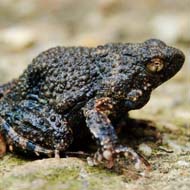
Foam from wild túngara frogs could reduce infection risk and antimicrobial resistance.
Foam found in frogs’ nests could aid the effective administration of drugs and combat the rise of antimicrobial resistance (AMR), according to new research.
The study published in Royal Society Open Science found that amphibian foam has the potential to offer benefits to topical, vaginal and rectal drug delivery in humans.
Researchers say the foam provides a controlled-release delivery, which reduces infection risk, AMR, and the risk of allergy. The study was conducted by Queen's University Belfast, the University of Strathclyde and the University of Glasgow.
“In testing the foam in our labs, we analysed the properties of the foam and were impressed that not only was it strong and durable, but when we administered drugs, they were released over a long period of time,” commented study co-author Dr Dimitrios Lamprou from Queen’s University Belfast.
“This controlled release and stable compounds has huge implications for drug delivery”.
Industrial foams are widely used in the delivery of medications and cosmetics, but there is high variability in the foamability and long-term stability of synthetic foams.
In the study, researchers collected foam from the nests of wild túngara frogs in their native Trinidad, which protects the species from extreme temperatures and harmful bacteria.
To see if the foam could offer a more durable system for drug delivery, the team carried out laboratory tests to assess its structure and composition. They also made nanoparticles to deliver drugs through the foam and found that the foam released the compounds slowly while the structure held together.
Dr Lamprou believes this controlled release and stable compounds could have significant implications for drug delivery.
“One practical example could be with burn treatment whereby the foam would enable the drugs to be delivered under the bandage over a longer period, without needed to remove the bandages frequently, which would reduce the chance of infection,” he said.
“Organic structures are also less irritable and less likely to cause allergies to human skin. Further testing is needed, but we are excited about the prospect of this novel drug delivery which could be used for proteins or siRNA.”
While the team has successfully produced the foam’s proteins in a laboratory using bacteria, they acknowledge that the frogs will be unable to produce enough foam to meet manufacturing demand.
The researchers are now concentrating on reproducing the exact foam and are analysing more drugs to see which ones lend themselves to this form of drug delivery.
“This is the first time an amphibian foam has been used for drug delivery,” commented Professor Paul Hoskisson of the University of Strathclyde and researcher on the study. “It should give us a nice, safe delivery vehicle that can be administered to patients without any fear of making them sick, unlike many of the other synthetic delivery vehicles.”



 The latest
The latest